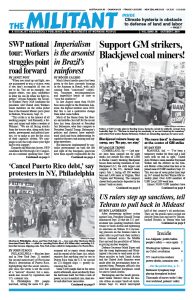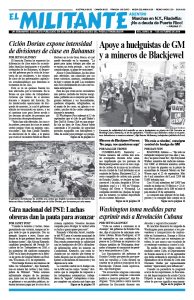After threatening military action against Iran, President Donald Trump announced Sept. 20 that the U.S. government was sending hundreds more troops to Saudi Arabia and tightening its sanctions on Tehran. It is increasing pressure on the Iranian rulers to enter talks to pull back their military forces stationed across the Middle East and end the possibility of Tehran acquiring nuclear weapons.
Defense Secretary Mark Esper said that the troop deployment and Washington’s decision to send more air defense missiles to both Saudi Arabia and the United Arab Emirates were made after the governments there requested them. Pentagon officials also said that additional warplanes could be sent to Saudi Arabia.
Washington and the Saudi government blame Tehran’s forces for missile strikes on major Saudi oil installations Sept. 14, which interrupted half of that country’s oil production. They say the attacks were carried out directly from Iran and not by Tehran-backed Houthis in Yemen who had claimed responsibility for the strikes. Tehran denies it was behind the attacks.
Washington and Tehran back opposing sides in Yemen’s four-year-long civil war, which has left 100,000 dead and millions facing famine. After the latest bombing of Saudi Arabia, Houthi leaders called for a cease-fire, offering to halt the military conflict in which Saudi air forces are bombing north Yemen while Houthi rockets target Saudi Arabia. Houthi leaders also demanded that the Saudi-led forces lift their blockade of the strategic port of Hodeida and Sana’a, the country’s capital.
The toll of the wars waged by the rulers in Iran and Saudi Arabia fall most heavily on working people. Tehran offers citizenship to the families of Afghan refugees who “volunteer” to fight in the militias it organizes in Iraq and Syria, while the Saudi government pays Sudanese families to send their sons to fight on the frontlines of battles it is waging in Yemen.
The U.S. troop deployment adds to the 500 troops sent to Saudi Arabia earlier this year, and another 1,500 deployed elsewhere in the Middle East since June as a show of force against Tehran. At that time, Washington cited attacks on oil tankers in the Arab-Persian Gulf and the downing of a U.S. surveillance drone, all of which Tehran denied responsibility for.
A fifth of the world’s petroleum supplies, which pass through the Strait of Hormuz at the mouth of the Arab-Persian Gulf, would be disrupted by any heightened conflict there.
The Trump administration is seeking to avoid escalating wars that involve U.S. soldiers. At the same time, it issues threats to use its military might and intensifies crippling sanctions on Tehran.
“As long as Tehran’s menacing behavior continues,” Trump warned the Iranian government Sept 24, “sanctions will not be lifted, they will be tightened.”
U.S. hands off Iran
“The U.S. government’s sanctions on Iran are an extension of the assaults the bosses and their government wage on workers and farmers at home,” explained Joel Britton, Socialist Workers Party candidate for mayor of San Francisco. “Working people should demand an end to the sanctions and the immediate withdrawal of U.S. forces from the Mideast.”
Washington, the only power to ever use nuclear weapons, is demanding the Iranian rulers relinquish their nuclear and ballistic missile program. As well as end their backing for Hezbollah in Lebanon and the Houthis in Yemen; withdraw the forces they command in Syria; and disarm the militias they organize in Iraq.
The Iranian rulers are determined to maintain their regional military and political clout but Washington’s economic squeeze is crippling the production and trade of the country’s capitalist rulers and worsening the conditions of life for working people. Iran’s oil exports have been choked off, depleting its reserves and causing its currency to devalue. On top of an existing economic crisis, this has caused inflation to surge.
Many workers are no longer able to afford meat, milk or diapers, and rents are skyrocketing, reported France 24. The U.S. National Security Council estimates that Iran’s pension fund system is close to collapse. The sharp decline in revenue from oil sales increases pressure on the government to cut its spending, including on subsidies it provides for basic necessities that millions of workers depend on.
The new U.S. sanctions target the Central Bank of Iran, the National Development Fund and other entities linked to the Islamic Revolutionary Guard Corps, especially its Quds Force, that Tehran uses to extend its power abroad. All their property is to be frozen and secondary sanctions leveled at other governments allowing transactions with them.

